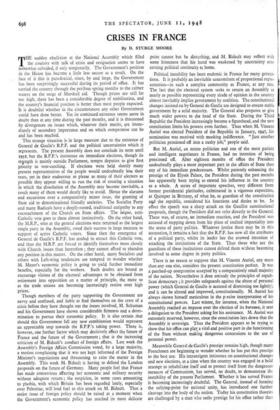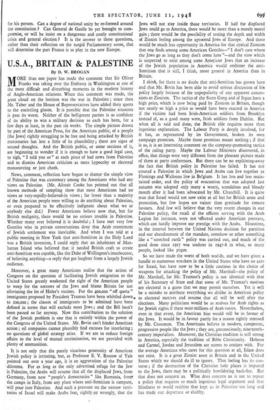CRISES IN FRANCE
By D. STURGE MOORE
THE sudden ebullition at the National Assembly which filled the couloirs with talk of crisis and resignation seems to have somewhat subsided, if only temporarily. The Government's position in the House has become a little less secure as a result. On the face of it this is paradoxical, since, by and large, the Government
has been surprisingly successful during its period of office. - It has carried the country through the perilous spring months to the calmer waters on the verge of Marshall aid. Though prices are still far too high, there has been a considerable degree of stabilisation, and the country's financial position is better than most people expected. It is doubtful whether in the circumstances any other Government
could have done better. Yet its continued existence seems more in doubt than at any time during the past months, and it is threatened by divergences on issues which, whatever their merits, are imme- diately of secondary importance and on which compromise can be and has been reached.
This strange situation is in large measure due to the existence of General de Gaulle's R.P.F. and the political uncertainties which it
represents. The present Assembly does not conclude its term until 195?, but the R.P.F.'s insistence on immediate elections, though its strfength is mainly outside Parliament, tempts deputies to give first priority to vote-catching. If elections were held shortly many present representatives of the people would undoubtedly lose their seats, yet in their endeavour to please as many of their electors as possible they appear willing to run the risk of creating a situation in which the dissolution of the Assembly may become inevitable, a result many of them would dearly like, to avoid. Hence the alarums and excursions over a comparatively minor issue, the granting of State aid to denominational friendly societies. The Socialist Party and many Radicals have a deeply-rooted, traditional antipathy to any encroachment of the Church on State affairs. The laique, anti- Catholic vote goes to them almost instinctively. On the other hand, the M.R.P., who at the general elections were returned as the largest single party in the Assembly, owed their success in large measure to support of active Catholic voters. Since then the emergence of General de Gaulle's R.P.F. has tended to attract this Catholic vote, and thus the M.R.P. are forced to identify themselves more closely with Church issues than heretofore ; they cannot afford to abandon any position in this matter. On the other hand, many Socialists and others with Left-wing tendencies are tempted to wonder whether M. Mayer's economic policy is going to yield further immediate benefits, especially for the workers. Such doubts are bound to encourage visions of the electoral advantages to be obtained from retirement into opposition on a matter of principle, the more so as the trade unions are becoming increasingly restive over high prices.
Though members of the party supporting the Government are nervy and confused, and liable to find themselves on the crest of a crisis before they have thought out the issues involved, M. Schuman and his Government have shown considerable firmness and a deter- mination to pursue their economic policy. It is also certain that should this Government fall any new combination would represent an appreciable step towards the R.P.F.'s taking power. There is, however, one further factor which may decisively affect the future of France and the future of the Government ; that is the increasing criticism of M. Bidault's conduct of foreign affairs. Last .week the Assembly's Foreign Affairs Commission voted, by a large majority, a motion complaining that it was not kept informed of the Foreign Minister's negotiations and threatening to raise the matter in the Assembly. This week M. Bidault is having to defend the London proposals on the future of Germany. Many people feel that France has made concessions affecting her economic and military security without adequate return ; the suspicion, in some cases amounting to phobia, with which Britain has been regarded lately, especially over Palestine, will lend fuel to this attack on M. Bidault. That a major issue of foreign policy should be raised at a moment when the Government's economic policy has reached its most delicate
point cannot but be disturbing, and M. Bidault may reflect with some bitterness that his hand was weakened by uncertainty con- cerning political continuity at home.
Political instability has been endemic in France for many genera- tions. It is probably an inevitable concomitant of proportional repre- sentation—in such a complex community as France, at any rate. The fact that the electoral system seeks to return an Assembly as nearly as possible representing every shade of opinion in the country almost inevitably implies government by coalition. The constitutional changes insisted on by General de Gaulle are designed to ensure stable government by a solid majority. The General also proposes to give much wider powers to the head of the State. During the Third Republic the President increasingly became a figurehead, and the new constitution limits his powers even further. Thus when M. Vincent Auriol was elected President of the Republic in January, 1947, his nomination was received with mocking indifference. " Just another politician pensioned off into a cushy job," people said.
But M. Auriol, an astute politician and one of the most patient and intelligent negotiators in France, had no intention of being pensioned off. After eighteen months of office the President undoubtedly plays a more important part in the affairs of State than any of his immediate predecessors. Whilst patiently enhancing the prestige of the Elysee Palace, the President during the past months has apparently been trying to extend his influence in the country as a whole. A series of important speeches, very different from former presidential platitudes, culminated in a vigorous exposition, at Quimper in Brittany, of what he, as guardian of the constitution mad the republic, considered his functions and duties to be. In effect the speech was a sharp attack on the Gaullist constitutional proposals, though the President did not refer directly to the General. There was, of course, an immediate reaction, and the President was accused of stepping down from his place of exalted impartiality into the arena of party politics. Whatever justice there may be in this accusation, it remains a fact that the R.P.F. has now all the attributes of a political party, whilst its leader has the avowed intention of attacking the institutions of the State. Thus those who are the guardians of these institutions cannot defend them without becoming involved to some degree in party politics.
There is no reason to suppose that M. Vincent Auriol, any more than any one else, considers the present constitution perfect. It was
a patched-up compromise accepted by a comparatively small majority of the nation. Nevertheless it does embody the principles of repub- lican democracy ; it provides safeguards against the abuse of personal power (which General de Gaulle is accused of dismissing too lightly), and it can be altered and improved, constitutionally. M. Auriol has always shown himself meticulous in the precise interpretation of his constitutional powers. Last winter, for instance, when the National Assembly reached an impasse over the election of its bureaux, it sent a delegation to the President asking for his assistance. M. Auriol was extremely reserved,lowever, since the constitution lays down that the Assembly is sovereign. Thus the President appears to be trying to show that his office can playa vital and positive part in the functioning of the State without making dangerous concessions to the use of personal power.
Meanwhile General de Gaulle's prestige remains high, though many Frenchmen are beginning to wonder whether he has put this prestige to the best use. His intransigent insistence on constitutional changes and new elections, at a time wh,en the country was engaged in a bold attempt to rehabilitate itself and to protect itself from the dangerous menaces of Communism, has served, no doubt, to demonstrate the instability of the present Parliament. Whether it has served France is becoming increasingly doubtful. The General, instead of forming the rallying-point for national unity, has introduced one further cleavage into the body of the nation. Today his constitution theories are challenged by a man who seeks prestige for his office rather than for his person. Can a degree of national unity be re-formed around the constitution ? Can General de Gaulle be yet brought to com- promise, or will he insist on a dangerous and costly constitutional crisis and general election ? It is the answer to these questions, rather than their reflection on the turgid Parliamentary scene, that will determine the part France is to play in the new Europe.































 Previous page
Previous page